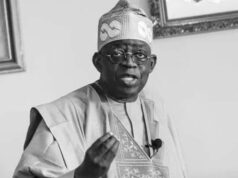SUN, JUN 14 2020-theG&BJournal- Nigeria’s overall economic performance between 2015 and 2019 were pressured more by exogenous variable beyond the control of economic managers and policymakers and the situation remains the same till date, says the Lagos Chamber of Commerce and Industry (LCCI) in their latest economic review.
Performance was negative in GDP growth, inflation, FDI, public debt, stock market All-Share Index, exchange rate and maximum lending rate within the period reviewed. FDI flows into the country declined driven by weak investors’ confidence resulting from heightened regulatory risks, state of infrastructure, policy risks, quality of dispute resolution systems, among others within the period.
LCCI reviewed the country’s economic performance within the period as part of its assessment of Nigeria’s ‘’DEMOCRACY AT TWENTY-ONE.’’
The moderate improvement in foreign reserves within the period could be ascribed to favourable oil prices. Improvement in credit to Private Sector and prime lending rate was driven largely by the aggressive push by monetary authorities for robust credit flows into the real economy.
‘’Meanwhile, the increase in maximum lending rate underscores the fact that cost of credit remains a challenge for businesses, particularly Micro, Small and Medium-sized enterprises (MSMEs),’’ the Chamber added.
LCCI said performance assessment based on global rankings shows mixed results. While the country improved on ease of doing business and competitiveness ranking, performance on corruption perception and human development was weak.
Nigeria’s 131st position on World Bank’s 2020 Ease of Doing Business Ranking is the best performance since 2010. This is a positive development attributable to several reforms by the Presidential Enabling Business Environment Council (PEBEC) aimed at making doing business easier. We note that Nigeria featured among the top ten improvers on the ranking.
For the Chamber, these improvements in ranking has not been adequately reflected in the reality of the daily experiences of investors, especially in the areas of energy cost for business operation, logistics challenges, regulatory issues, security situation in parts of the country and the processes of cargo clearing at the sea ports.
On Global Competitiveness Ranking, while the data showed improvement from 127th position in 2015 to 116th in 2019, relative comparison with performance of African peers such as South Africa (66th), Morocco (75th) and Egypt (93rd) in 2019,underscores the need for much greater efforts to improve the competitiveness of the business environment.
Nigeria’s ranking on Corruption Perception Index (CPI) ranking dropped from 136th to 146. This underlines the need for much greater efforts in fighting corruption. It should however be acknowledged that some achievements have been recorded by the antigraft agencies, especially regarding some high-profile corruption cases. President Buhari reported in his democracy day speech that the anti-graft agencies have secured more than 1400 convictions and recovered funds in excess of N800 billion.
For Human Development Index (HDI) Ranking, Nigeria fell a spot lower to 158th position in 2018 from 157th position in 2015, still within the low human development category.This reflects the poor funding of the education and health sectors at all levels of government. The poor state of public educational and health institutions are graphic illustrations of the situation.
While the Global Peace Index ranking shows marginal improvement, the level of insecurity in parts of the country, attacks by Boko-Haram sect, kidnapping, armed robbery, banditry and farmers-herders tussle, ethnic clashes remain a major cause for concern.
The LCCI VERDICT is that the present administration’s performance, from a socioeconomic and welfare perspective, was not up to scratch.
‘’The data on trends in per capita income, poverty, unemployment and food inflation supports this position. Per capita income fell steadily between 2015 and 2018. Although dataset ended in 2018, however judging from present realities, GDP per capita fell further in 2019 as population growth rate (estimated at 2.7%) exceeded GDP growth (2.27%) in 2019.’’
‘’The performance from poverty reduction perspective gives cause for concern.’’
In 2018, Nigeria overtook India as the country with the world’s most extreme poor people despite India having a population seven times larger than Nigeria’s. According to the World Poverty Clock, the number of extremely poor Nigerians rose to 91.6 million in 2019 from 87 million in 2018, implying that close to half of Nigerian’s population size live below the poverty line. A more recent data by the National Bureau of Statistics put poverty rate at 40% in 2019, indicating that 80 million Nigerians are in poverty.
Worsening poverty situation in Nigeria is partly driven by rising cost of living particularly prices of food products. The acceleration in average food prices from 9.9% in 2015 to 13.7% in 2019 reinforces this position. Other factors are inadequate investment in social infrastructure [education and health] at all levels of government, quality of infrastructure which is a major limiting factor to productivity growth in the economy.
The unemployment situation in Nigeria worsened as rate of joblessness spiked from 10.44% in 2015-Q4 to 23.1% in 2018-Q3. Latest unemployment figure of 23.1% does not reflect recent realities following the Covid-19 induced downturn in the economy.
Productivity issues, quality of educational curriculum, rising population, weak economic diversification, and fragile economic growth are some of the key drivers of unemployment.
On account of sectoral contribution to the Gross Domestic Product [GDP], LCCI said: ‘’it could be argued that the Nigerian economy is diversified. However, the non-oil sector which contributes over 90% to total economic activities, contributes an estimated 50% to revenue and less than 10% to foreign exchange earnings. These outcomes underline the imperative of scaling up productivity and competitiveness in the non-oil sector of the economy.’’
Performance of major ten sectors was largely weak particularly in sectors with potentials to spur economic diversification.
While growth of the manufacturing sector advanced to 0.77% in 2019 from -1.46% in 2015, present realities provide evidences that the sector failed to improve within reviewed period due to myriad challenges such as poor infrastructures, weak purchasing power, competition, high production cost and unfavourable economic conditions. More importantly, the real economy (agriculture, manufacturing, trade and constructive) continues to underperform as result of growth and productivity challenges. The impact of the 2016-17-naira devaluation also contributed to their poor footing.
The strong growth performance in ICT & Communication and Transport & Storage was acknowledged. The performance in ICT could be ascribed to the increasing ICT application in many sectors, notably the financial services sector. The general increase in the tempo of economic activities, especially in the distributive trade sector, was a major driver of growth in the transport & storage.
Inadequate finance combined with poor educational and health infrastructures constrained growth performance in the health and education sectors. Overall, sectoral performance between 2015 and 2019 was weak.
LCCI notes that data limitations constrained a quantitative assessment of the current administration’s performance in infrastructure.
‘’Nonetheless, the state of physical infrastructure remains a challenge to socioeconomic development of the nation. Deplorable road networks, inefficient railway system, weak port infrastructures and epileptic power supply constitute significant cost pressures on businesses and corporates. This further resulted in weak global competitiveness of domestic firms and declining profit margin by investors in the country.
‘’The Federal Government’s resolve in improving the quality of infrastructures by constantly seeking liquidity to fund capital projects is noted. The country’s infrastructural challenge stems from the fact that it is spending far below the recommended $100 billion yearly required to finance infrastructure deficit under the infrastructure masterplan.
LCCI concludes that the Nigerian economy has tremendous potentials both in terms of human and material resources.
‘’Sustained engagement with stakeholders and the adoption of evidence-based policy formulation process would bring considerable value to the economy. The imperative of policy, regulatory and institutional reforms cannot be over stressed.’’
|twitter:@theGBJournal|email: info@govandbusinessjournal.com.ng|
Home Business Nigeria’s macroeconomic fundamentals since 2015 adjudged weak, stifled by exogenous variable beyond...









